Scroll Down to Read Today’s Essay
Subscribe to Baseball History Comes Alive for automatic updates. As a Free Bonus, you’ll get instant access to my Special Report: Gary’s Handy Dandy World Series Reference Guide!
Del Crandall Photo Gallery
Click on any image below to see photos in full size and to start Photo Gallery:
We’re Contacted By the Son of Milwaukee Braves Outstanding Catcher, Del Crandall!
“I never have to shake him off. He knows the job like no one else, and you can have faith in his judgment.” -Lew Burdette, speaking of his catcher Del Crandall
As I’ve said many times, we always enjoy it when we’re contacted by a relative of a former major leaguer. Anyone who makes it to the “Big Show” is special in our eyes. It’s even more special when the player was one of his era’s most dominant players at his position.
When evaluating former ballplayers from days gone by, we have to rely on the stark, cold career numbers we find on the pages of Baseball-Reference, leaving us with a one-dimensional view of the player. “He was good, but what kind of man
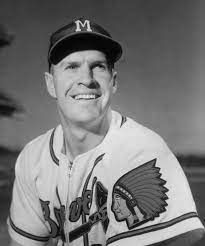
was he?” we ask ourselves. We have no way of knowing. It’s only when a family member or friend contacts us that we can assess intangibles like character and integrity. This gives us a much more rounded, nuanced perspective.
Such was the case in my recent phone conversation with Bill Crandall, son of the Milwaukee Braves’ outstanding catcher, Del Crandall. As a long-suffering Cub fan from the mid-1950s, I was very familiar with Bill’s dad. The Cubs of that era were not very good and were usually no match for the powerful Braves of Hank Aaron, Eddie Matthews, Joe Adcock…and catcher Del Crandall.
Often overshadowed by his Hall-of-Fame teammates, Del Crandall was one of the most dominant catchers of the era. Offensively, he put up steady, if unspectacular, numbers over his 16-year big league career (1949-1966). Del hit .254, with 179 homers and 657 RBIs. Powerfully built at 6’1”, 190 lbs, the eleven-time All-Star topped 20 home runs three times. At his retirement in 1966, 179 home runs ranked fourth all-time by National League catchers, and is still in the top-25 all-time.
In the eighth inning of Game Seven of the 1957 World Series, in which the Braves defeated the Yankees four-games-to-three, Del hit a pivotal solo home run, giving the Braves a 5-0 lead. The run later grew in importance as the Yankees loaded the bases in the ninth inning. Del also hit a home run in Game Seven of the 1958 World Series, this time coming in a losing cause.
Impressive numbers, but it was on defense where the Fullerton, California native left his mark. Tough as nails behind the plate, he possessed a strong, accurate arm that threw out 45.44% of base stealers. An astute handler of pitchers known for his outstanding pitch calling, Del guided Braves’ staffs to many first or second-place team ERA finishes from 1953 to 1959.
Del retired among career leaders in many defensive categories: putouts (4th), total chances (8th), and fielding percentage (5th). His 1,430 games caught in the National League trailed only Al Lopez, Gabby Hartnett, and Ernie Lombardi. Del won four of the first five Gold Glove awards given to National League catchers and tied another record by catching three no-hitters. He and Warren Spahn started 316 games together, second only to Mickey Lolich and Bill Freehan since 1900.
Those numbers don’t tell the complete story. SABR baseball researcher Richard Kendall devised a study ranking major league catchers by “fielding dominance” (1). Using a formula based on defensive categories and total chances, Kendall ranked Del Crandall as the fourth-most dominant fielding catcher in major league history.
There is much more to Del Crandall than mere numbers. Bill Crandall is understandably proud of his dad for his many accomplishments on the field, but his performance “off the field” is equally impressive. Bill’s admiration for his dad came through in our short conversation. He described his dad as a loving father devoted to his seven children:
“Dad made us all feel special in his eyes, we were always treated fairly and equally. There was no favoritism and no one was better than anyone. Dad kept our egos in check and made sure we always stayed grounded.”
Recurring words Bill used to describe him included “humble,” “strong character,” “integrity,” “straight-laced.” Bill quickly added that Del possessed a sharp, dry sense of humor (Bill called it, “the Crandall humor”) that he passed on to his children. The man who emerges from Bill’s description was one whose success never seemed to go to his head. Self-promotion just wasn’t in his genetic makeup. He was content to let his actions on the field—and in life—speak for themselves:
“He was a wonderful role model for our close-knit family. He set an example of how to live a good life. He had an encyclopedic knowledge of baseball and was a natural leader with an incredible ability to communicate his baseball acumen to his peers. Mike Sciocia once said he didn’t know anyone in baseball that knew more than dad did about the game. As a youth growing up hanging around major league players and clubhouses, I always felt the respect his teammates had for him.”
As the son of a major leaguer, Bill had a wonderful childhood, but he never felt he received any special favors or was treated differently than his friends. I got the feeling Del never would have allowed it. Bill mentioned that Del’s humble nature may have hindered his chances for further recognition after he retired:
“Whenever I prodded him to get his name out there in the public eye—as is common with many former players—so as to get more managerial jobs offers, or even to enhance his chances for the Hall of Fame, his short response was always the same: ‘They know where they can reach me if they want me.’”
I asked Bill if he could remember any instances of his dad saying a bad word about any former teammates. Not surprisingly, Bill had to think hard to come up with an answer. The best Bill could remember was that his dad was “disappointed” with Braves’ manager Bobby Bragan for not playing him more in 1963 after his outstanding 1962 season at age 34 when he hit a career-high .297 and caught 107 games. Bragan’s decision likely resulted in Del’s trade to the Giants a year later, separating him from his Braves’ teammates and the great fans of Milwaukee.
Bill remembers Del became close friends with teammate Eddie Mathews. “It was a yin and yang thing,” was Bill’s apt description, as the two ballplayers had strikingly different personalities. “Dad was once called a ‘milkshake kid’,” Bill said, “but Mathews, well, not so much.”
Eddie enjoyed playing jokes, and the straight-laced Crandall was an easy target. Once, while enjoying a drink in a bar, a surprised Crandall suddenly found a pretty young lady perched upon his lap…thanks to the prodding and instigation of Eddie Mathews!
Bill shared stories via his dad from the Braves clubhouse. Warren Spahn was the team clown (but only on days he wasn’t pitching). One day, while teammate Bobby Thomson lay exposed on the trainer’s table, Spahnie threw cold ice water over the unsuspecting Thomson. He did this not once but on three separate occasions. After the third time, Bobby had enough and grabbed Spahn by the neck, picked him up, and forcibly dunked his body, head first, in a whirlpool full of water…and held him there! “If someone hadn’t intervened, who knows what might have happened!” Del related.
But Spahn wasn’t through with Thomson. He’d often spit tobacco juice on Bobby’s spikes while Bobby was sitting on the bench. Finally, Bobby had enough and retaliated against the great Hall-of-Famer by chasing Spahn into the equipment room behind the dugout where the players heard a lot of equipment being thrown around.
After retirement, Del became a highly successful minor league manager within the Dodgers, Brewers, and Angles organizations. He’s credited with developing many
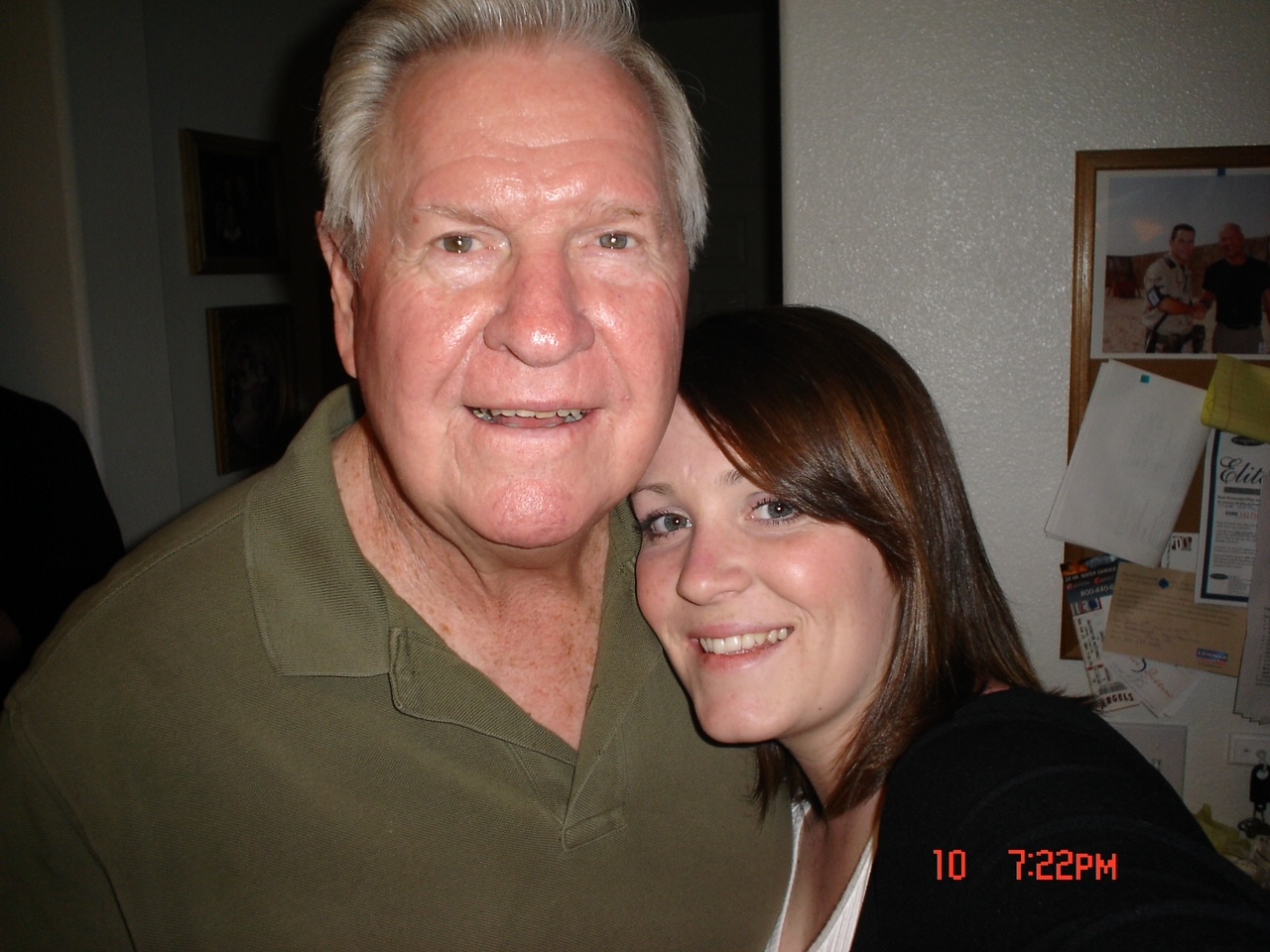
young players, including Sam McDowell, and helping catcher Darrell Porter develop into an outstanding, hardnosed backstop. Later, Del went into the broadcast booth as a color commentator for the White Sox and the Brewers.
I could go on relaying information from Bill Crandall. In this limited space, I’ve tried to convey the high level of esteem in which Bill and his siblings held for their dad, and the important role he played in their lives. I came away with a much deeper appreciation for the character of this outstanding ballplayer—one of the best defensive catchers in baseball history—but who was, I think we can all agree, an even greater man.
Del Crandall passed away May 5, 2021, aged 91, after complications from Parkinson’s disease. His wife of 62 years, Fran, preceded him in death in 2014. Our condolences go out to Bill and the entire Crandall family on the recent passing of their brother, Del Crandall, Jr.
Gary Livacari
- https://members.tripod.com/bb_catchers/catchers/dominate.htm
Sources: March 13, 2022 phone conversation with Bill Crandall; SABR biography of Del Crandall by Gregory Wolfe; and the Del Crandall Wikipedia page. Statistics from Baseball-Reference.com
Subscribe to our website, “Baseball History Comes Alive!” with over 1200 fully categorized baseball essays and photo galleries, now surpassing the 700K hits mark at 782K hits and over 600 subscribers: www.baseballhistorycomesalive.com
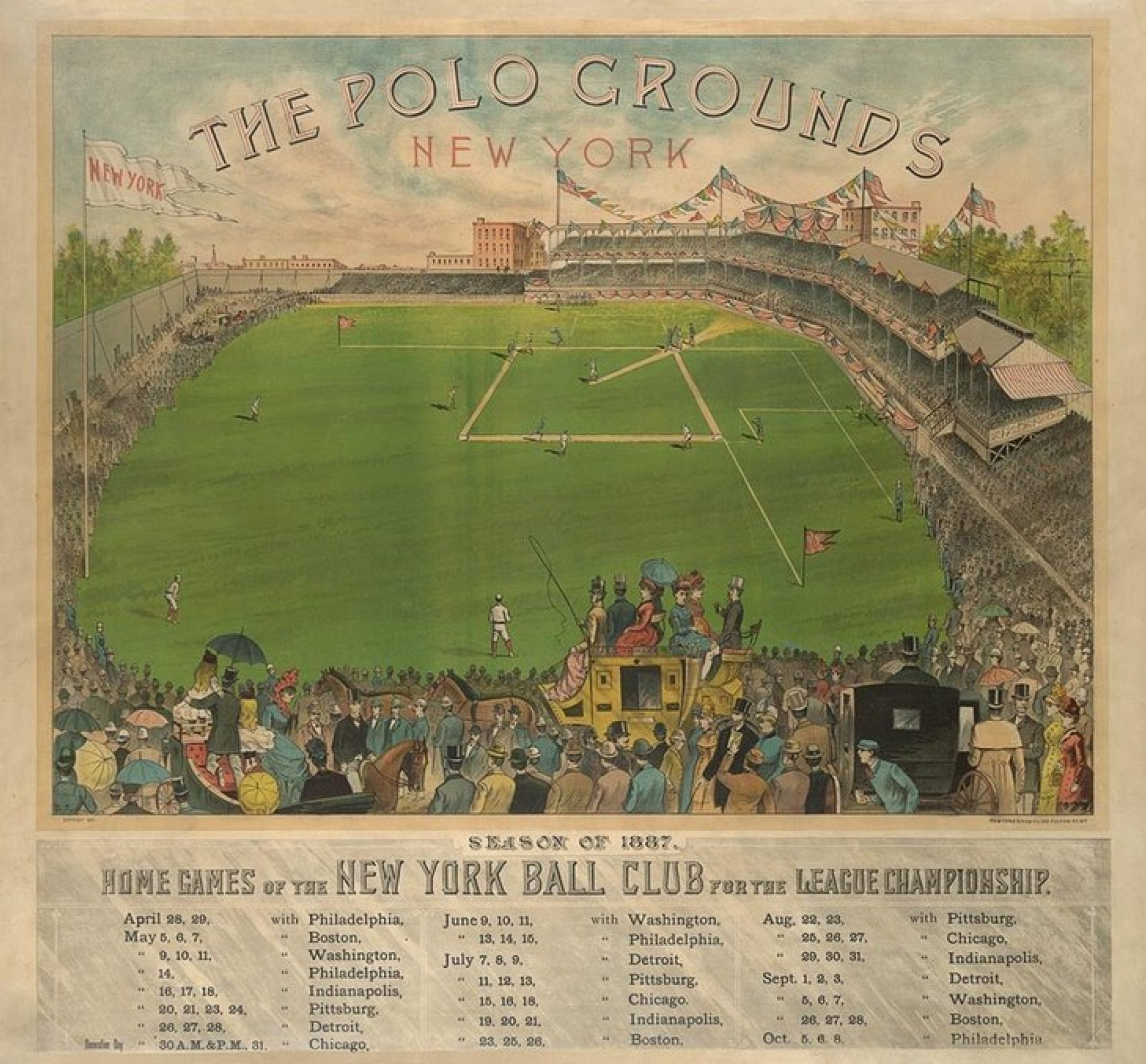
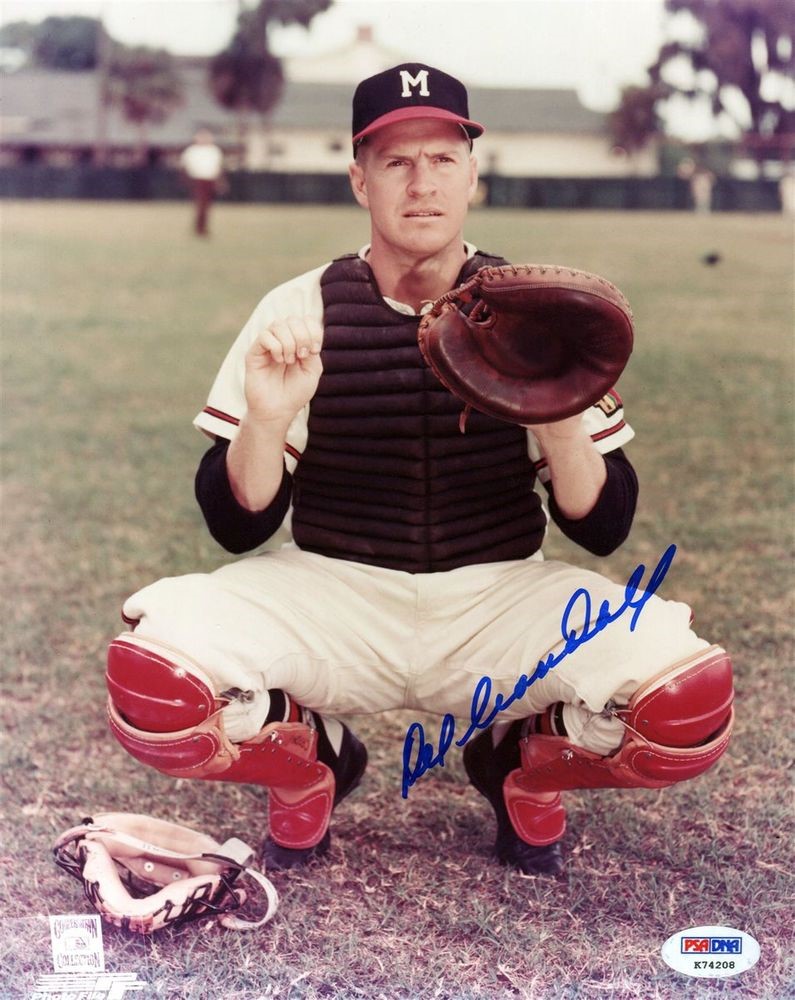
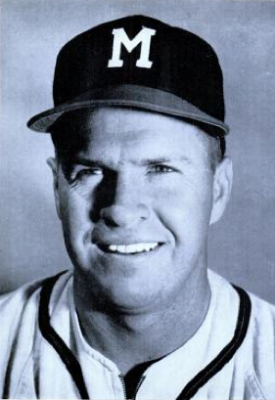
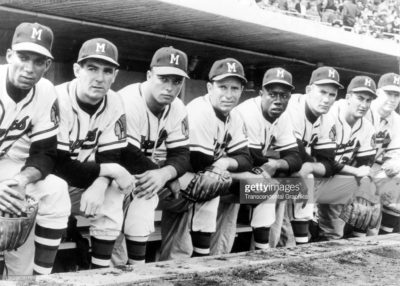
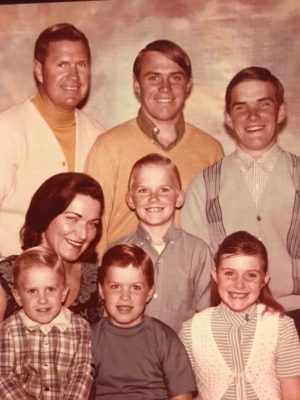
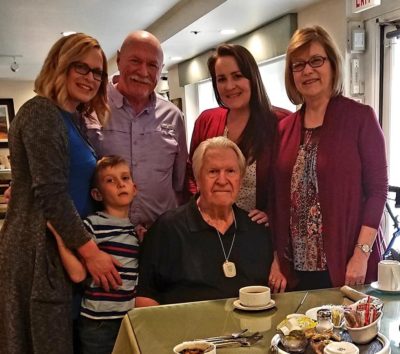
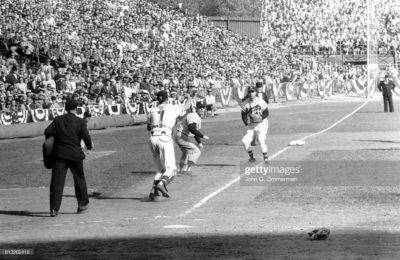
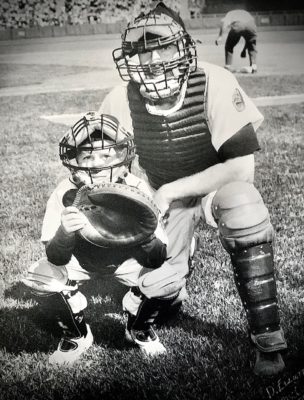
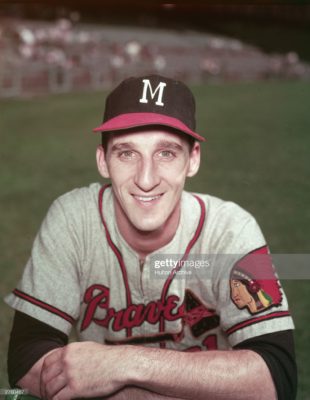
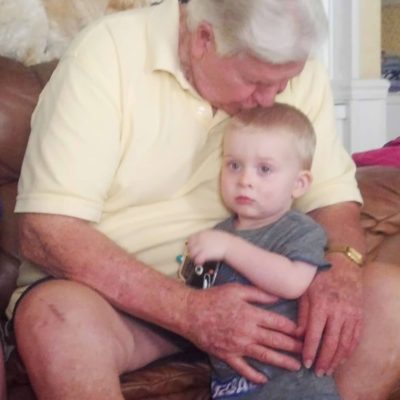
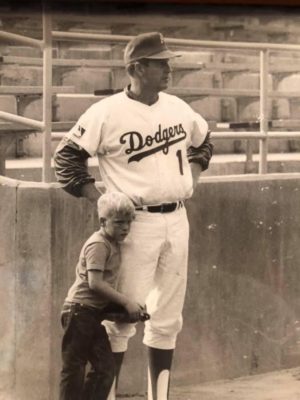
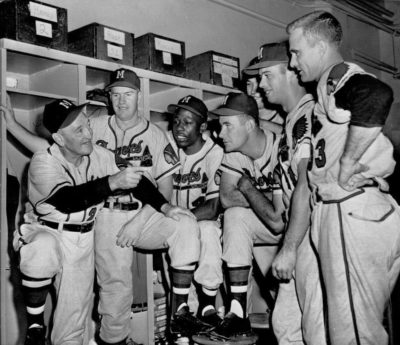
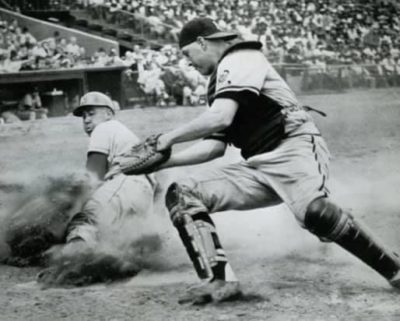
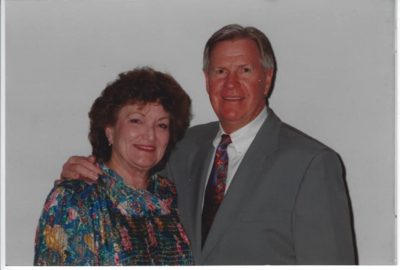
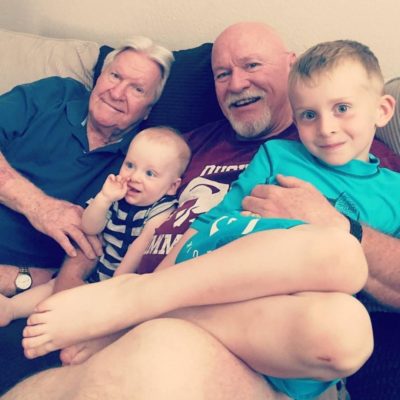
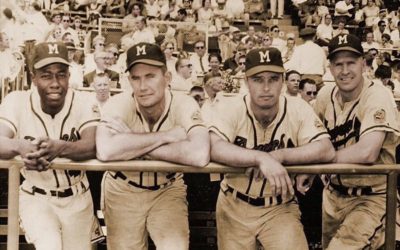
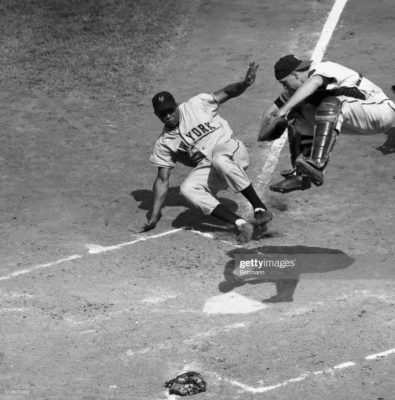
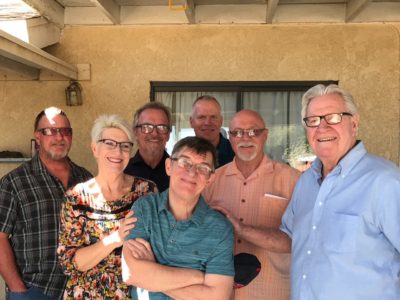
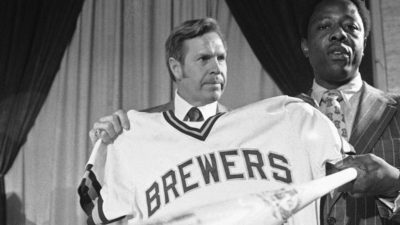
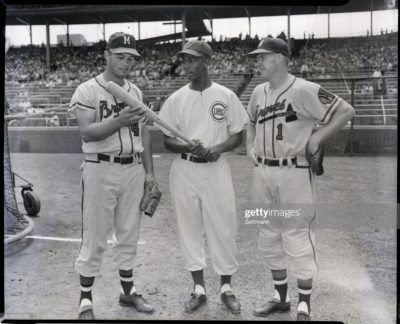
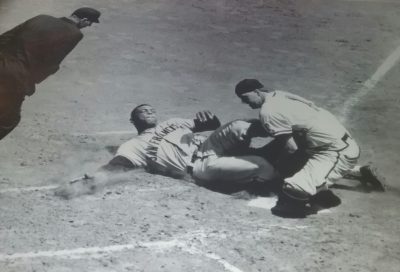
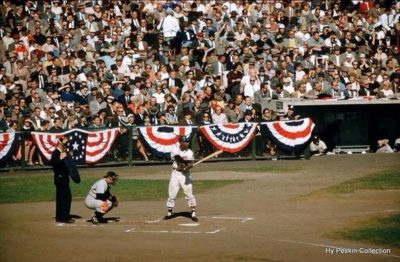
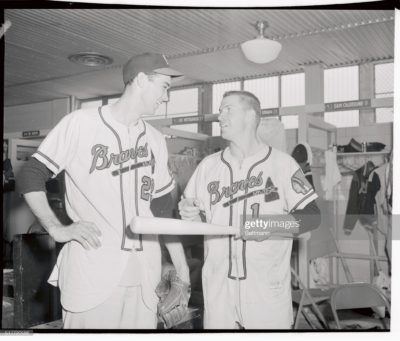
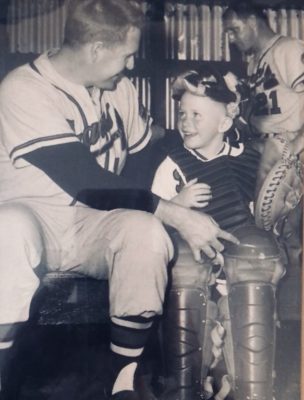

Gary,
Great story. Last of the old Boston Braves. Years ago, I attended a couple of Boston Braves Historical Association
annual dinners where Crandall was a guest.
This may already be resolved, but see comment section on attached linked story. Someone replied that they were living in Crandall’s old home and still had a cement block with handprints and names of Del’s children. Where you have touched base with him, maybe you can give him a heads up. Crandall died 10 months ago, so maybe contact has already been made:
https://ripbaseball.com/2021/05/08/obituary-del-crandall-1930-2021/
Thanks Paul. I’ll pass that on to Bill Crandall.
The old Braves field is partly physically standing albeit only the ticket office/ one grandstand remain as it was retrofitted as a rectangular field for Boston University.
It was pretty neat to take tours before the BBHA dinners. You did have to use your imagination to visualize Warren Spahn looking for the sign from Crandall from the mound.
Crandall did play for his first two years with Boston and missed out on a third in the service in 1951.
Nice stat on the most pitcher/ catcher battery starts.
If both stay healthy, the Cardinals may move from fourth to first this year as Adam Wainwright/Yadier Molina start the year at 304.
The Braves were my boyhood NL team favorite and Crandell and Gus Triandos of the Orioles seemed to be cut from the same mold; great on defense, some power, usually an all-star, and very durable. You just penciled in Del’s name in the lineup every day, not like today’s catchers that spend most of their time on the disabled list. I am sure Del played through injuries. I always thought with a better manager that the Braves could have won more Pennants in that Era; Aaron, Mathews, Adcock, Pafko, Crandell, Bruton, Logan, Schoendienst, Spahn, Burdette, I do not think they really knew how good they were,
What’s interesting is that they came within a game or two of winning pennants in both 1956 and 1959. In 1959 losing in a playoff to the Dodgers. Think how that team would have been remembered if they had won four pennants in a row!
An outstanding player and such a great credit to the game! After the ’59 playoff loss to LA, the fickle Milwaukee fans just seemed to desert the Braves. Continued decline in attendance led to the exodus to Atlanta after the ’65 season. I will never understand how the locals lost interest in their team so quickly. Were they simply spoiled by the great years of ’57 & ’58? Remember, the Braves were up 3 games to 1 versus the Yankees in the ’58 WS before losing the last 3. Did the decline start then?
What say you?
I really don’t have an explanation. Maybe someone who lived there during those years can sort things out for us…
What a great story! Del was a premier catcher in an era of superstars. How many players can say they were teammates and shared lineups with Hall Of Famers: Hank Aaron, Eddie Matthews, Warren Spahn, Juan Marichal, Orlando Cepeda, Willie Mays, Willie McCovey, Gaylord Perry, Roberto Clemente, Willie Stargell, and Bill Mazeroski.
Thanks Ken for the comment. Please stay in touch!
Gary,
I left Duke Snider Of that list.
I love stories like that …
There was a book Aaron to Zuverink (spelling) that told about players …not their stats, but personal tidbits …
Thanks
Nick Snider
In answer to Monte, the decline in Milwaukee attendance was attributed, I believe, to the Braves eliminating the fans designated picnic area in the stands, where families would enjoy a huge spread of food and drink as they enjoyed the game.
It was all about the fans feeling alienated when the local sense of camaraderie was suddenly denied them. Sort of a one-big-happy-family atmosphere that was sabotaged in their minds.
That’s the essence of what I remember, maybe someone can offer more along those lines.
Bill,
My guess is that fan exhaustion (I.e.—novelty factor) started to kick in as the team started its downfall to mediocrity. Plus the biggest drops began in 1961 when the Twins started playing. The Twins captured
a big portion of their fandom from Western Wisconsin.
Many an old times Twins fan will tell you they were big Braves fans in the 50’s. Now, they had a team of their own- and rising with their young stars.
Neither city is large market; but when you add another regional team in the next state over, you are going to
split devotion. The new owners of the Braves were from Chicago and were probably aware with two additional teams 90 miles south and no big demographic population to the east, it was not going to get any better.
It’s ironic that Milwaukee started the franchise relocation frenzy just 12 years prior which lead to St. Louis, Philadelphia, New York and Brooklyn to follow to new cities all within a 4 year period.
Anti-trust echoed and a potential new league led to the expansion era in the early 60’s.
Milwaukee did fight the relocation, but was not ultimately successful. It is not
Generally known how close the Supreme Court got to hearing the case. Only the appointment of a new SUpreme Court appointee (Abe Fortas-who had to recuse himself due to just being appointed) was deadlock 4-4 on an appeal from lower courts.
The attached linked story makes interesting reading:
https://law.marquette.edu/facultyblog/2012/01/why-milwaukee-lost-the-braves-perspectives-on-law-and-culture-from-a-half-century-later/comment-page-1/
Thanks Paul, that’s some great info and clears things up a lot.
Hi Gary,
What a tribute! Very informative, accurate, and much deserved by Mr. Crandall’s loving survivors.
I remember some fifty years ago, almost to the day, when Carl Erskine told the audience (on the Dick Cavett Show) of having spoken with Crandall frequently during their playing days about their Down Syndrome children, a point not mentioned in your article but worthy of note in my opinion.
My dear bride was the loving (and caring) older sister of a Down Syndrome child, and when I learned years later that their widowed mother refused the urgings of many acquaintances to have Little Sis institutionalized “for her own good” and for the family’s convenience, I was reminded of guys like Crandall and Erskine, who treated all their children without a hint of discrimination on that or any other basis.
God bless true gentlemen of such high caliber! In my mind, all their fielding stats and pitching numbers, impressive as they were, pale totally in comparison with characters like that.
Best regards,
Michael
Thanks much, Michael. You’re right about that. Bill Crandall did mention that he had a brother, Ronnie, who passed away at age seven. He mentioned Ronnie had some handicap. I decided to respect the family’s privacy and didn’t specifically mention it.
Some story on Warren Spahn tormenting Bobby Thomson. Warren was lucky-I can understand Thomson’s rage.
I was a business friend of a guy, who was the visiting team bat boy for the New York Giants back in the day. He told me Spahn was ostensibly a nice guy but would really push the clubhouse people with late night card games. He would insist on refreshments way past the designated time limit after a game and refused to leave until he was good and ready. A real pain in the neck, he told me, among other places.
We all tend to remember the good old days of baseball, but if you look at the history of average attendance of MLB, the leagues averaged less than 5,000 or less during the dead ball era; climbed during the live ball era (heavily impacted by the building of Yankee Stadium and the draw that the Babe became) to an average of no more than 8,000 per game all the way through the war years.
Post WWII is when baseball boomed as well as the relative affluence of the overall population.
Still, the game never averaged more than 16,000
fans per game all the way through to 1978.
The baby boomer nostalgia era began in 1980 and average attendance slowly climbed into the low 20’s to mid 20’s to over 30,000 until the strike year of 1994.
It took until 2004 to hit 30,000 per game game until 2017 started a downward trend back to 29,000.My observation is that is when the analytics accelerated, pitching especially, and games became unwatchable at times. The pandemic years
had no fans in 2020 and averaged 18,000 last year due to many restrictions until almost mid year.
It should be interesting in 30 years when Baseball History Comes Alive contributors will be reflecting on the “good old days” of baseball of the early part of the 21st century.
The earliest part of the 20th century was known as the “Dead Ball Era”; hopefully, we are not living the “Dead Game Era”.